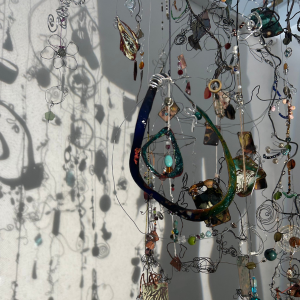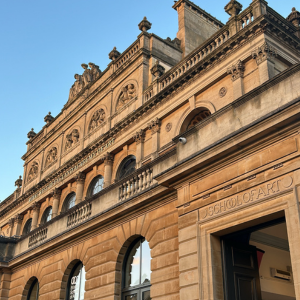The BA (Hons) Fine Art and Material Practice offers you the opportunity to develop and articulate your creative identity as an artist or maker at a professional level. This course equips you with the practical skills, critical understanding, and professional insight necessary to establish a sustainable creative practice—whether as an independent artist or within a broader career in the arts and related fields. Located in the cultural heart of Bristol, this degree course —awarded by the University of Gloucestershire—offers a stimulating environment in which to explore, develop and define your creative identity.
Our curriculum is rooted in a culture of curiosity, experimentation, dialogue, and critical reflection, with material engagement at its core. You will be encouraged to investigate and challenge contemporary art practices while exploring the diverse cultural contexts that shape art-making today.
We believe that through active engagement with material practice, you will cultivate a personal methodology for interpreting and responding to lived experience. The course provides opportunities to experiment with and specialise in a wide range of techniques including drawing, printmaking, painting, and 3D processes such as sculpture, ceramics, small metals, and textiles, as well as digital media including photography, moving image, and software within the Adobe Creative Suite. These diverse skills will contribute to the development of your distinctive creative voice.
At Bristol School of Art, we are proud to foster an inclusive, supportive learning environment. The degree is underpinned by a strong commitment to equity, ecological responsibility, sustainable practice, and collaborative learning. A nurturing approach to both creativity and academic development, lies at the heart of our teaching philosophy.
A key focus of the degree is employability and the development of transferable skills. Creative and critical thinking are integral to the course design, supported by technical training, collaboration, and professional practice modules. These include sector-relevant activities such as funding applications, exhibition curation, and an off-site public showcase of your work.
As you progress through the course, you will be encouraged to work with increasing independence and autonomy. Later-stage modules are designed to refine your creative and conceptual skills, and to deepen your understanding of how artists and makers contribute to wider cultural, social, and commercial environments—both historically and in the contemporary landscape.
Assessment is continuous and based on portfolio submissions, presentations of practical work, and formal critiques—there are no written examinations. Your artistic output remains the primary focus throughout the course, enhanced by opportunities that simulate real-world professional practice.
Awarded by the University of Gloucestershire, delivered at Bristol School of Art
STUDENT TESTIMONIAL
DEGREE ART SHOW 2023




.png)
%2520(6)-p-500.png)
-p-500.png)
%2520(3)-p-500.png)
%2520(5)-p-500.png)
.png)
.png)
.png)
.png)
.png)

.png)
